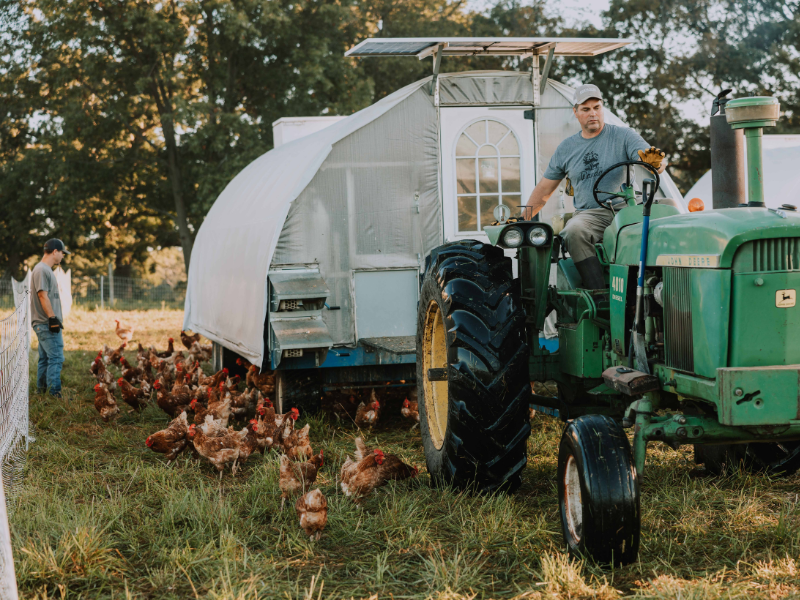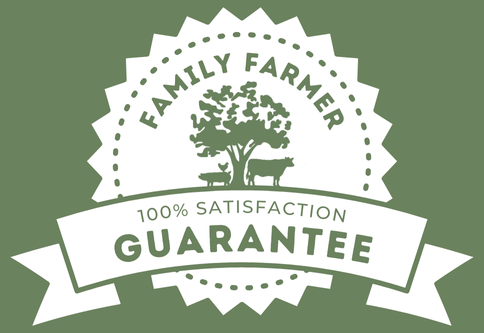Why are the grocery meat prices rising?
posted on
January 8, 2022
Have you seen how much meat prices have increased over the past couple years at the grocery store?
Maybe that is what lead you to our farm?
I never notice because we obviously just eat our homegrown meats.
However, I hear from new customers and from the media constantly how much prices are increasing and how much the quality has decreased.
Recently, I had a friend send this YouTube video to me.
It did a good job explaining there's a monopoly that four major meat packers have on 85% of the beef market. A bit scary. Which you already know this if you've been following me for a while.
Most of all it explained how the beef farmers are actually not benefiting from the increase in beef prices at the super market. Many family farms are still struggling despite the record high prices in the grocery stores!
Current markets for commodity beef farmers have increased recently a little, but not to the same rate that their counterparts (packers) are selling retail beef and meanwhile expenses are continuing to rise for the farmers. And these big meat packers are having record profit margins over the last 2 years and these farmers are still struggling. It doesn't seem right.
We are talking 3rd and 4th generation family farms that can't pay their bills. Finally selling out to a bigger player that has the economies of scale and special contracts with the big meat packers. It's sad and I sympathize for these farmers.
However, I'm not a believer in playing the victim mentality, I do believe the world and times are always evolving and farm business should be changing with the times too.
As I ruminated on this subject and after watching the video, maybe this is the wake up call for big change?
It's an interesting time we are in and I'm un-sure what the exact answer to the solution is.
We could make revisions in the farm bill to help these family farmers with more subsides, but the truth is, most of these farmers don't want handouts! They take pride in working hard for a living independently.
Then we could pass legislation for anti-trust laws that controls these big corporate meat packers.
But yet again, are we just putting a band aid on an already broken system? Do we really want this way of food production to continue long term?
Again, I don't know what the answer is and this is a complicated and difficult issue.
I do think though this is a great time and opportunity for family farmers to sell direct to the consumer. Take the retail profit margins back to their family farm.
Also this creates a better opportunity for the consumer to voice to the farmer how they want their animals raised vs. the big meat packers having control of the farmers and what they present to the consumer.
This would continue to drive up the demand for small meat processors. This could create more local butcher shops and help break the monopolies.
I do believe this could radically change and improve our rural farming communities.
What I fear though is many of the farmers aren't willing to make the necessary changes.
I recently had a conversation with an old farmer and I shared about how we raised all the animals out on pasture. He responded to me and said, "I remember farming like that as a kid, but then they (the university or publications) told me, we need to be bigger and more efficient by putting the cattle in the barn and truck feed to them." He said he was thankful to not having to go tracking through the mud no more now that the cattle are all on concrete.
He wasn't happy about the current situation, but also wasn't hurting enough to want make any changes anytime soon.
It was the same message when I went to college too, "we need to grow more and faster to feed the growing world". But we never had conversations about the nutrition of industrial food has on our health and the environmental impact. Nor did we talk about the impact consolidation is having on the health of local economies.
I'd like to see more conversations about these issues in the education system.
It is awesome to see how over the last 2 years more consumers have looked for a farmer to provide them their food directly and are voting NO to the industrial food system. I know I've said this many times, but will continue. Your food dollars are the best way of voting for a better system, rather then hoping someone else fixes it.
I am optimistic for the future and think that more farmers will get on board, as they see the direct to consumer farms succeeding and the consumers voicing their unhappiness with the industrial farm model.
I envision a future where the consumers are healthier and happier with their food, family farm businesses are healthier, livestock are raised in humane conditions, environment improved for generations to come, and a healthier local economy.
While we pursue those endeavors, let's go enjoy a Wanda Farm steak and feel good knowing we supported local business not a major meat packer, as we all continue to solve the world problems together. 😊
Be on the look out for my email next week, as I have a special announcement on how you can have food security at a locked in price for 2022.
Blessings,
Joe




